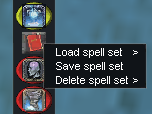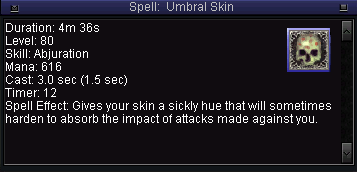Related Articles: Spell Scrolls and Tomes, Buffs & Debuffs
1 Scribing and Memorizing Spells
2 Navigating the Spell Book
3 Modifying the Spell Book
4 Spell Sets
5 Spell Attributes
5.1 Skill
5.2 Recast Delay
5.3 Casting Speed
6 Specialization
7 Channeling and Interruption
8 Target Types
After obtaining a spell scroll, open your spell book (default key: Ctrl+B). Pick up the spell scroll on your cursor and click in an empty box in your book to scribe it.
Besides clicking the left and right arrows in the book, the spell book can also be navigated in two other ways:
- Use the left and right arrow keys. If they don't respond at first, click one of the arrows in the spell book to put focus on the spell book, then use the arrow keys.
- Use the /book command to jump to a specific page, for example: /book 11. This can be handy if you're swapping spells back and forth between the front and the back of your spell book.
You can change the position of spells, and even delete them permanently from your book.
In order to move a spell, or swap the position of two spells, right-click either slot. Its border in the book will now flash yellow. Right-click the spot in your book where you want it to be, and they will trade places. The same technique can be used to move a spell to an empty slot. You can also start by right-clicking an empty slot if that's more convenient.
In order to delete a spell from your book permanently, first right-click it. Its border in the book will now flash yellow. Next, hit the Delete key, and you will get a confirmation prompt. Click Yes, and the spell will be permanently deleted.
On your spell bar you will see a button (by default at the bottom; UI modifications can place it elsewhere), with the icon of a little red book. You can left-click this to open the spell book, but it can also be right-clicked, which will show this context menu:
Click "Save spell set", enter a name, and your set of memorized spells are now saved. You can reload them by going to the "Load spell set" menu and choosing it by the name you gave it.
Examples of spell set you may consider: Buffing, fighting, headshotting, swarming, frost nukes, etc.
You can also use the /memspellset command to load a specified spell set.
Right-click and hold a spell in your book or on your spell bar in order to see more information about the spell. A window like this will appear:
Some of the most relevant attributes are listed here. If you want to dig deeper into a spell, look it up on Lucy, where every possible attribute is listed.
The following five spell skills (also called schools) exist, and all spells players have access to are tied to a skill:
- Abjuration - Typically buffs.
- Alteration - Typically heals, buffs, debuffs, crowd control and more.
- Conjuration - Typically spells that conjure/summon items, also used for some Shaman and Necromancer DoTs and nukes.
- Divination - Typically invisibility spells and vision-altering spells.
- Evocation - Almost always direct damage spells, aka. nukes.
Raising a skill reduces the risk of fizzling spells of that skill, adjusted by the spell's level. What this means is that if you are untrained in a skill, which Divination will typically be for example, and attempt to cast a brand spell you received at level 50, you will most likely fizzle it endlessly. To counter this, train your skill by using a low-level spell. Spell skills are gained equally from low-level and high-level spells, so just use the cheapest, fastest-casting spell you can find in your book to skill up.
Some spells have a waiting period before they can be cast for the first time after memorizing them, and after a successful cast. This is put in place for some spells that might otherwise be too powerful to "chain cast". After memorizing or having cast the spell, its gem will turn red and show a cooldown along with a tooltip, indicating how long until you can cast the spell again.
An example of a spell with a recast delay is Gate, which has a recast delay of 8 seconds. Spirit of Cheetah has a recast delay of 10 minutes.
Casting speed is measured in seconds, with one decimal, for example 3.5 seconds. Some spells are instant-cast, although they will still trigger a recast delay. A few spells take up to 30 seconds to cast.
Casting speed can be improved with AA and focus items, which will typically halve their casting time with modern gear.
Casters (not hybrids) can specialize in one skill in order to further raise their ability to cast without fizzling, along with reducing the mana use of such spells. For INT-based casters (Enchanter, Magician, Necromancer and Wizard) upon reaching level 20, and for WIS-based casters ("priests" - Cleric, Druid, Shaman) at level 30, they will be granted 5 new skills: Specialize Abjure, Specialize Alteration, Specialize Conjuration, Specialize Divination and Specialize Evocation. The first of those skills to be raised to 51 will be the caster's main specialization, and can from thereon be raised to between 200 and 275 (goes up slightly with level). The other skills will be capped at 50, until higher levels where they can be raised to 200.
Specializing in a skill lessens the risk of fizzling spells of the skill further, and decreases the mana cost of spells from that skill. At 200 skill, the mana saving is 10%. At 50 skill, the saving is 2.5%.
Casters can choose a secondary specialization at level 55 with the AA Secondary Forte, which allows you to raise a second specialization by 50 points.
If you are unhappy with your chosen specialization(s), you can do the quest Respecialization from The Temple of Solusek Ro.
Channeling is a skill that all spell casters possess. The higher the skill, the less you have of having your spell interrupt when you're hit by melee from monsters while casting. Starting out at skill level 1, a new spell caster will have an incredibly difficult time getting any spell off when being hit by melee, but this gradually gets better as their Channeling skill is raised.
Stun spells, such as Force will always (provided they are not resisted or mitigated in some other fashion) interrupt spell casting.
All spells have a target type that determines who and what the spell affecs. The type can be seen in the "Target Type" field of the spell data.
- Corpse - Only castable on the corpse of a dead player (example: Reviviscence)
- Group v1 - Used to affect only your own group, and still holds true for non-buffs (such as heals and cures for example), but today, they too can be cast on other groups (example: Pack Shrew)
- Group v2 - Affects an entire group, either your own or the group of the player you have targeted. Set /tgb on before casting to buff other groups (example: Regrowth of Dar Khura)
- PC, Group Only - Only castable on a player (PC), and must be in the caster's group (example: Bind Affinity)
- Pet - Only castable on your own pet (example: Burnout IV)
- Self - Only affects the caster (example: Arch Shielding)
- Single - Affects the current target only, either one self or another player (example: Shield of Lava)
- Single Party Member - Only castable on a group member (example: Spirit of the Puma)

